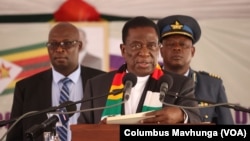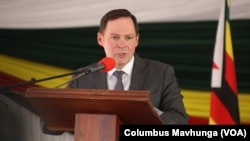Russia has donated 25,000 tonnes of grain and 23,000 tonnes of fertilizer to Zimbabwe to help cope with the impact of an El Niño-induced drought that has reduced crop yields across much of southern Africa.
President Emmerson Mnangagwa accepted the donation on Wednesday, saying it would help ease Zimbabwe’s ongoing drought and targeted sanctions that the government has long blamed for the country’s economic downturn.
“Zimbabwe and the Russian Federation continue to be subject to outrageous and illegal sanctions imposed by Western hegemons,” he said. “During the 23 years of sanctions against Zimbabwe, the Russian Federation has been a true, trustworthy and reliable ally of the people of that country.”
The president added that it is not surprising that the two countries under sanctions talk to each other and try to cooperate.
In the early 2000s, Western countries imposed travel and financial sanctions on Zimbabwe’s leadership and its affiliates over alleged election rigging and human rights abuses.
The United States recently lifted sanctions against most Zimbabweans, but some high-profile figures, including Mnangagwa, remain on the list.
Meanwhile, Russia and its president, Vladimir Putin, are under sanctions following the invasion of Ukraine two years ago.
On Wednesday, Russia’s ambassador to Harare, Nikolay Krasilnikov, said the donated fertilizer would help Zimbabwe’s agricultural production.
Krasilnikov said: “This is a commitment made by Russia to continue to support countries and regions in need and to do its best to prevent a global food crisis by participating in establishing a more equitable resource distribution system.” “Let us not forget , food security cannot [be achieved] There is no need for chemical fertilizers as they ensure crop growth, resilience and productivity. ”
However, these fertilizers may not work during Zimbabwe’s current growing season as most crops have dried up due to lack of rain.
Alexander Rusero, a professor of international relations at Africa University, said in an interview that he was not surprised by Russia’s donations to Zimbabwe.
“Zimbabwe does not have an ambivalent foreign policy towards Russia,” Rusero said. “Its position on interaction with Russia [is] very clear. Zimbabwe sides with Russia at all costs, so this is not surprising. I don’t know why Zimbabwe looks surprised to receive a gift from Russia. Remember, these are the fulfillment of promises made not too long ago. ”
Zimbabwe’s electoral commission sent a delegation to Moscow to observe this week’s Russian election, in which Putin won another six-year term. At a press conference in Moscow, commission chair Priscilla Chigumba declared the election credible.
“We found that the general atmosphere was conducive to the elections, with people feeling relaxed and happy as they exercised their right to vote,” Chigomba said. “We believe this is a clear sign of a mature democracy where elections are not viewed as a life-or-death exercise.”
The comments sparked widespread criticism in Zimbabwe and were condemned by multiple observer missions, including the Southern African Development Community, given the irregularities and delays in the way the country’s 2023 elections were managed by the country’s Electoral Commission.
Follow us on Google news ,Twitter , and Join Whatsapp Group of thelocalreport.in

